David soon finds himself drawn into a world of fairy tales given dark, and one must say, adult interpretations. Once there he is pursued by man-wolfs (hint: Red Ridinghood gets a significant rewrite), and an even more sinister character, the Crooked Man. The story proceeds predictably, ending with an anticlimactic and oddly saccharine conclusion.
The characters are flat and uninteresting excepting only David’s father and his second wife, who are peripheral to the tale. David himself is neither believable nor engaging. Apparently casting the story as a tribute to lost innocence and entry into adulthood, the author seems to have missed the obvious point that a mature understanding of the world involves years of real life experiences, not something generally accomplished by a young boy during a sojourn of several weeks in a fairy tale. No matter how twisted.
For a similar, but more adroitly told and compelling story, try Clive Barker’s The Thief of Always. Barker’s tale, unlike Connolly’s, is suitable for younger readers.





No comments:
Post a Comment